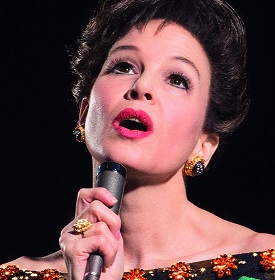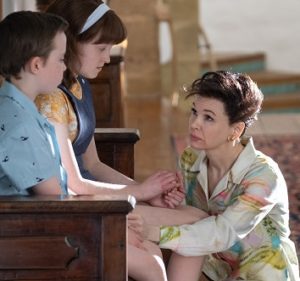Judy
 In 1969, former superstar Judy Garland embarked on a string of sold-out concerts in London as a means of reviving her sagging career. To put it politely, the engagement was a disaster. Some nights, Garland would wow the crowd, showing off her old magic and captivating the audience in the palm of her hand, as she paraded through a mishmash of her old hits. Other nights, she was so drugged up on pills and booze that she’d stumble around the stage, seemingly unaware she had a show to perform. One night, she even fell on stage.
In 1969, former superstar Judy Garland embarked on a string of sold-out concerts in London as a means of reviving her sagging career. To put it politely, the engagement was a disaster. Some nights, Garland would wow the crowd, showing off her old magic and captivating the audience in the palm of her hand, as she paraded through a mishmash of her old hits. Other nights, she was so drugged up on pills and booze that she’d stumble around the stage, seemingly unaware she had a show to perform. One night, she even fell on stage.
Final chapter
British theatre director Rupert Goold chronicles this unfortunate final chapter in Garland’s life in his new biopic “Judy,” starring Renee Zellweger as the American icon, and newcomer Darci Shaw as young Judy Garland, making her film debut in the 1939 classic “The Wizard of Oz.” Most of the action takes place during the British gig, but we experience just enough of the young Garland to understand how she ended up a hopeless drunk thirty years later.
We see Richard Cordery as a perfectly creepy Louis B. Mayer grooming young Judy for a life of not just acting but of Hollywood fame and celebrity. We see her handlers pumping her with pills to curb her appetite. “We can’t have a pudgy Dorothy,” Garland is repeatedly warned. But such intense career management robbed Judy of her youth, in much the way Michael Jackson’s was taken from him. Neither recovered.
Still pathetic
It is because of these early scenes that we understand the plight of the 47-year-old Garland in London. We get it. But she’s still pathetic. The demise of a one-time idol is not necessarily something many of us desire to watch unfold before our eyes. Granted, “Judy” is based on Peter Quilter’s Broadway play, “End of the Rainbow,” but it would have been nice to concentrate more on the majestic, show-stopping, middle portion of Garland’s career – a block of time sadly missing from these proceedings.
Instead, we’re privy to what seems like an endless barrage of alcohol, prescription medication, and embarrassing public displays of bad behavior. This was my criticism of “Rocket Man,” the recent biography of Elton John. It concentrated so heavily on John’s personal demons that it left no time to delve into the glorious works of his career. The same is true of “Judy.”
Zellweger in fine form
Having said that, Zellweger gives the performance of a lifetime as the former American darling – complete with every twitch, eye movement, and vocal infliction that marked her later years. It’s a spot-on impression, and her acting achievement is the highlight of this film.
Best scene
Also strong in supporting roles are Michael Gambon and Royce Pierreson as an older gay couple who adore Garland. Their post-concert encounter with the famous entertainer is one of the highlights of “Judy.” I only wish there had been more original characters like theirs to flesh out what seems like a long two hours.
The husbands
Rufus Sewell plays Garland’s fourth husband Sidney Luft – father of her young daughter and son. It’s a thankless role, as Luft must act as both father and mother, while Garland is unable to either support her children or provide them the stability their young lives require.
Finn Wittrock plays Garland’s fifth husband Mickey. More of a fan than a lover, he visits her in London, resulting in their inevitable nuptials. The scene in which their brief marriage dissolves is so predictable I could have written it myself. It’s television movie-of-the-week material, and scenes like this cause “Judy” to be a choppy and unpredictable experience – particularly when contrasted with the sharp, witty writing of the scene with the gay admirers.
Jessie Buckley
But for me, the most disappointing aspect of “Judy” is that her British “handler” Rosalyn is played by a young Irish actress named Jessie Buckley. Rosalyn is everything Judy is not – organized, punctual, and practical. She gets more than she bargained for with the assignment to drive Garland from her hotel to the performance venue every night. Rosalyn must also ensure that Garland is dressed, sober, and eager to go on stage. She’s as much a life coach to Garland as she is the keeper of her schedule. The contrast between the two characters is defined and intentional.
So why is Buckley’s appearance so disconcerting for me? Because she played the lead in a much better film this summer called “Wild Rose.” Seen by almost no one, “Wild Rose” told the fictional story of a working-class Scottish mother of two whose lifelong dream was to make it big in Nashville as a country singer. “Wild Rose” was everything “Judy” is not. Uplifting, inspirational, and majestic, Buckley’s show-stopping performance made me want to stand up and cheer. Watching “Judy” makes me cringe with embarrassment as I watch the pathetic denouement to a once-great career.
Performance is superior to film
Again, I understand “Judy” is based on a Broadway play. I understand the material is factual. But that doesn’t mean I want to spend two hours wallowing in sadness over the trajectory of Judy Garland’s life. I understand MGM (and, by extension, the old studio system) is, in large part, responsible for Garland’s demise. But then how does one explain the fact that Debbie Reynolds, Shirley Temple, and countless others were apparently not negatively affected by the heavy-handed tactics of the movie studios?
Zellweger is great. Unfortunately, her performance is simply superior to the material in “Judy.”
Andy Ray’s reviews also appear on http://youarecurrent.com/category/nightandday/film-reviews/
and he serves as the radio film critic for https://lifestyleindy.com/radio/
